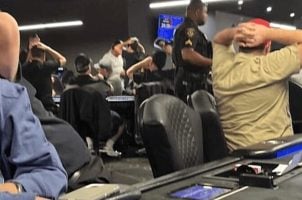WSOP Seventh-Place Finisher Nick Marchington Sued by Backers for $152,500
Posted on: August 4, 2019, 09:32h.
Last updated on: August 4, 2019, 12:24h.
World Series of Poker final tablist Nick Marchington went on the winning run of his dreams last month. The 21-year-old from England picked up $1.525 million for his seventh-place finish at the WSOP Main Event, only his second live tournament cash-in. But now, he’s being sued for ten percent of it.

A judge in Nevada has filed a temporary restraining order blocking Marchington from collecting a slice of his newfound riches until a spat with two of his backers is settled in court.
Fellow poker pros Colin Hartley and David Yee say they bought ten percent of Marchington’s action in the $10,000 Main Event through their staking company, C Biscuit Stables, and now they want their cut.
But Marchington argues that the deal was off before the Main Event got underway. He claims he owes them nothing.
How Does Staking Work in Poker?
Staking is common practice in the poker world, as it allows individual players to spread risk by selling pieces of their action, particularly in high buy-in tournaments like the Main Event. Stakes will usually be purchased at a markup, which will be agreed upon between the player and the backer. Generally, the better the player’s perceived chances, the more he can charge.
Yee and Hartley offered Marchington a 1.2 markup for their 10 percent, which means they paid him $1,200 as part of a handshake deal. But later, Marchington was made an offer he couldn’t refuse – another party offered him a 1.7 markup for the same 10 percent.
I am playing the main event, but unfortunately your piece is cancelled,” Marchington wrote to his initial backers in a text message on June 29, several days before the Main Event kicked off, according to court filings. “I know this is bad practice. But I have to do what’s best for myself since I lost on the trip. Will get back to you about your refund.”
While Marchington’s actions may be considered bad etiquette, they are likely not illegal because of the absence of a written contract signed by both parties. Court documents show that while C Biscuit Stables responded that it was “highly disappointed,” and noted his behavior was “not normal by the poker community standards,” it had little recourse other than to accept the refund.
Late Payment
But the refund didn’t arrive until after the Main Event was underway, on Day 2, when the Englishman was already among the chip leaders. According to court filings, the delay was due to Marchington’s inability to get his hands on the immediate cash. The backers had paid him digitally via his PokerStars account, but had stipulated a cash refund would be the preferred option.
Yee and Hartley have hired hotshot Las Vegas law firm Chesnoff &Schoenfeld. They’re asking for $152,500, plus legal fees.
Marchington’s lawyer Ronald Green says he believes a poker player “has the necessary free will to exit the agreement at any time.”
“That C Biscuit accepted the refund is revealing unto itself,” Green argued in court filings. “This suit was brought only once Mr. Marchington won a significant sum of money in the Main Event; it seems highly unlikely C Biscuit would have dispatched another associate to return Mr. Marchington’s refund had he not won any monies in the Main Event and, instead, simply lost his entry fee.
“Or, stated otherwise, it certainly appears C Biscuit was at peace with the agreement being cancelled and a refund being collected, until such a time as it realized the agreement would have been lucrative in nature,” he wrote.
Related News Articles
California Poker Scandal Atypical of Sector, Says Plaintiffs’ Attorney
DA Drops Charges Stemming from Raid on Texas’ Largest Poker Club
Most Popular
Mirage Las Vegas Demolition to Start Next Week, Atrium a Goner
Where All the Mirage Relics Will Go
Most Commented
-
Bally’s Facing Five Months of Daily Demolition for Chicago Casino
— June 18, 2024 — 12 Comments
















No comments yet